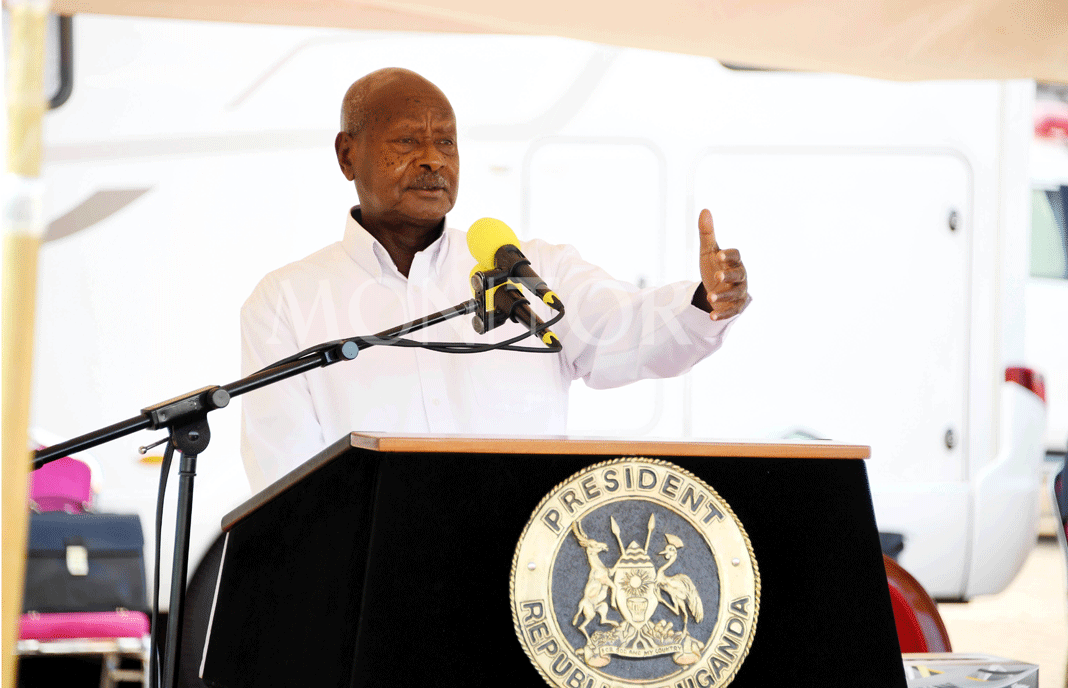Museveni renews battle with wetland abusers

President Museveni speaks after the reading of the National Budget at Kololo Ceremonial Grounds in Kampala on June 14, 2022. PHOTO/DAVID LUBOWA
What you need to know:
- The President says only those who were ‘misled’ by the colonial government to live in water catchment areas will be compensated.
President Museveni has ordered all encroachers out of wetlands across the country with immediate effect.
During the Budget speech, the President told legislators and other government officials that there should be no negotiations with encroachers, who have deliberately invaded wetlands and settled there.
The President, however, said there are people who were forced into wetlands by the colonial government, adding that these groups will be compensated, but those who willfully settled in and conducted illegal activities in wetlands would be kicked out withought any compensation.
“All of us must tell these people, especially the ones, the old problem of wetlands which was created by the British in Busoga, Bukedi and Kigezi, where they misled our people to go into wetlands thinking that was a good thing. These ones, I have a programme to remove them out by compensating, because they didn’t do it themselves, they were misled by the government,” he said.
No compensation
“But in other areas, people who are going to the wetlands are going by themselves and against our appeals. I demand that all these people get out of the wetlands unconditionally. We don’t have to negotiate because they knew it was not right but they insisted, even here in Kampala, I see these people entering a bit in Lubigi swamp and these other swamps,” he added.
The President said the current rise in food and other commodities prices can be resolved if Uganda has enough food in stock to insulate against global price hikes.
“In our budgeting, there is now something about irrigation. But in future, I would like us to do more for irrigation so that we stabilise agriculture, and there is no shortage of food even if the rain is more erratic,” he said.
Mr Museveni, however, said this cannot be achieved if the encroachment on wetlands and water reservoirs is not stopped.
He said Uganda has fertile soils, but that for agriculture to be sustainable even during dry season, there must be constant source of water through irrigation. He said if the wetlands are protected from degradation, it will be possible to engage in such irrigation schemes.
“Once we bring back our water because 20 percent of Uganda is under fresh water, then we shall be able to irrigate easily and have a secure agriculture and that can give us room to solve other problems,” he said.
Infrastructure development
Mr Museveni also said until 2005, Uganda’s infrastructure projects were largely donor-driven, adding that since they funded them, they dedicated what was to be done and when.
He said this was because donors allegedly sat with officials from the Finance ministry and decided, without consulting him, that all development programmes should be left for donors, while government uses the money it generates to run the recurrent expenditures.
The President, however, said when he learnt of it, he called for a Cabinet meeting, which reversed the decision, thus the robust infrastructure development across the country.
“By 2005, we had a big shortage of electricity that when load shedding started and after the 2006 elections, I called the conference of Cabinet but also the NRM caucus and I said I cannot accept this. We must budget money for both recurrent and development expenditure and we agreed. That is when we put more money on roads and electricity,” he said.
“Now I was checking the results of the move and if you go on the roads, most roads, even here in Kampala City, are government funded,” he added.
He went on to list a number of roads and other infrastructure facilities, which have been constructed using the money generated from within without depending on donor funding.
The President also said starting next financial year, government must budget for compulsory primary education, which must extend to the secondary education. He said it is unacceptable that while more pupils enrol in primary, the transition rate to secondary education only stands at 38 percent, leaving 62 percent of pupils out of school.
“These children drop out because of school charges. This is a big problem. The enrolment in primary school is about 10 million, but in the secondary school, it is only two million. Therefore, I call upon you, especially the younger people, that we budget for compulsory education in primary school. We should not be talking of two million, we should be talking of 10 million in secondary schools,” he said.
“In the next financial year, we should insist on free and compulsory primary and maybe even in secondary education and stop these fellows who are greedy for money for education,” he added.




